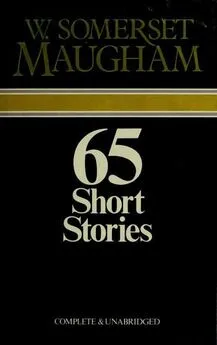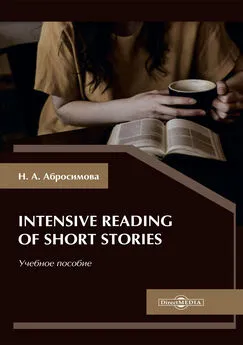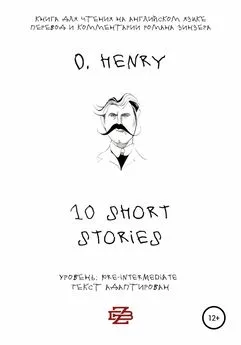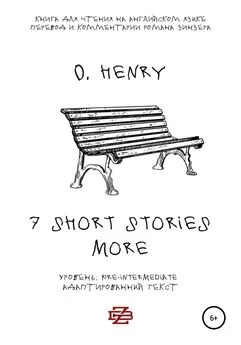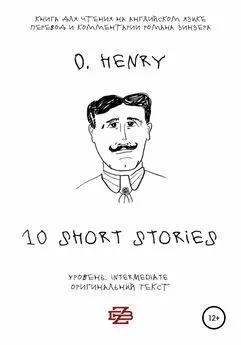Somerset Maugham - Sixty-Five Short Stories
- Название:Sixty-Five Short Stories
- Автор:
- Жанр:
- Издательство:неизвестно
- Год:неизвестен
- ISBN:нет данных
- Рейтинг:
- Избранное:Добавить в избранное
-
Отзывы:
-
Ваша оценка:
Somerset Maugham - Sixty-Five Short Stories краткое содержание
Sixty-Five Short Stories - читать онлайн бесплатно полную версию (весь текст целиком)
Интервал:
Закладка:
'Where is she?' screamed Madame Perier. She ran into the narrow passage, opening doors, and called the girl's name. 'Annette, Annette. Oh, what madness!'
'Perhaps in the sitting-room.'
They ran downstairs to the unused parlour. An icy air met them as they opened the door. They opened the door of a storeroom.
'She's gone out. Something awful has happened.'
'How could she have got out?' asked Hans sick with anxiety.
'Through the front door, you fool.'
Perier went up to it and looked.
'That's right. The bolt's drawn back.'
'Oh, my God, my God, what madness,' cried Madame Perier. 'It'll kill her.'
'We must look for her,' said Hans. Instinctively, because that was the way he always went in and out, he ran back into the kitchen and the others followed him. 'Which way?'
'The brook,' the old woman gasped.
He stopped as though turned to stone with horror. He stared at the old woman aghast.
'I'm frightened,' she cried. 'I'm frightened.'
Hans flung open the door, and as he did so Annette walked in. She had nothing on but her nightdress and a flimsy rayon dressing-gown. It was pink, with pale blue flowers. She was soaked, and her hair, dishevelled, clung damply to her head and hung down her shoulders in bedraggled wisps. She was deathly white. Madame Perier sprang towards her and took her in her arms.
'Where have you been? Oh, my poor child, you're wet through. What madness!'
But Annette pushed her away. She looked at Hans.
'You've come at the right moment, you.'
'Where's the baby?' cried Madame Perier.
'I had to do it at once. I was afraid if I waited I shouldn't have the courage.'
'Annette, what have you done?'
'I've done what I had to do. I took it down to the brook and held it under water till it was dead.'
Hans gave a great cry, the cry of an animal wounded to death; he covered his face with his hands, and staggering like a drunken man flung out of the door. Annette sank into a chair, and leaning her forehead on her two fists burst into passionate weeping.
The Escape
I have always been convinced that if a woman once made up her mind to marry a man nothing but instant flight could save him. Not always that; for once a friend of mine, seeing the inevitable loom menacingly before him, took ship from a certain port (with a tooth-brush for all his luggage, so conscious was he of his danger and the necessity for immediate action) and spent a year travelling round the world; but when, thinking himself safe (women are fickle, he said, and in twelve months she will have forgotten all about me), he landed at the selfsame port the first person he saw gaily waving to him from the quay was the little lady from whom he had fled. I have only once known a man who in such circumstances managed to extricate himself. His name was Roger Charing. He was no longer young when he fell in love with Ruth Barlow and he had had sufficient experience to make him careful; but Ruth Barlow had a gift (or should I call it a quality?) that renders most men defenceless, and it was this that dispossessed Roger of his commonsense, his prudence, and his worldly wisdom. He went down like a row of ninepins. This was the gift of pathos. Mrs Barlow, for she was twice a widow, had splendid dark eyes and they were the most moving I ever saw; they seemed to be ever on the point of filling with tears; they suggested that the world was too much for her, and you felt that, poor dear, her sufferings had been more than anyone should be asked to bear. If, like Roger Charing, you were a strong, hefty fellow with plenty of money, it was almost inevitable that you should say to yourself: I must stand between the hazards of life and this helpless little thing, oh, how wonderful it would be to take the sadness out of those big and lovely eyes! I gathered from Roger that everyone had treated Mrs Barlow very badly. She was apparently one of those unfortunate persons with whom nothing by any chance goes right. If she married a husband he beat her; if she employed a broker he cheated her; if she engaged a cook she drank. She never had a little lamb but it was sure to die.
When Roger told me that he had at last persuaded her to marry him, I wished him joy.
'I hope you'll be good friends,' he said. 'She's a little afraid of you, you know; she thinks you're callous.'
'Upon my word I don't know why she should think that.'
'You do like her, don't you?'
'Very much.'
'She's had a rotten time, poor dear. I feel so dreadfully sorry for her.'
'Yes,' I said.
I couldn't say less. I knew she was stupid and I thought she was scheming. My own belief was that she was as hard as nails.
The first time I met her we had played bridge together and when she was my partner she twice trumped my best card. I behaved like an angel, but I confess that I thought if the tears were going to well up into anybody's eyes they should have been mine rather than hers. And when, having by the end of the evening lost a good deal of money to me, she said she would send me a cheque and never did, I could not but think that I and not she should have worn a pathetic expression when next we met.
Roger introduced her to his friends. He gave her lovely jewels. He took her here, there, and everywhere. Their marriage was announced for the immediate future. Roger was very happy. He was committing a good action and at the same time doing something he had very much a mind to. It is an uncommon situation and it is not surprising if he was a trifle more pleased with himself than was altogether becoming.
Then, on a sudden, he fell out of love. I do not know why. It could hardly have been that he grew tired of her conversation, for she had never had any conversation. Perhaps it was merely that this pathetic look of hers ceased to wring his heart-strings. His eyes were opened and he was once more the shrewd man of the world he had been. He became acutely conscious that Ruth Barlow had made up her mind to marry him and he swore a solemn oath that nothing would induce him to marry Ruth Barlow. But he was in a quandary. Now that he was in possession of his senses he saw with clearness the sort of woman he had to deal with and he was aware that, if he asked her to release him, she would (in her appealing way) assess her wounded feelings at an immoderately high figure. Besides, it is always awkward for a man to jilt a woman. People are apt to think he has behaved badly.
Roger kept his own counsel. He gave neither by word nor gesture an indication that his feelings towards Ruth Barlow had changed. He remained attentive to all her wishes; he took her to dine at restaurants, they went to the play together, he sent her flowers; he was sympathetic and charming. They had made up their minds that they would be married as soon as they found a house that suited them, for he lived in chambers and she in furnished rooms; and they set about looking at desirable residences. The agents sent Roger orders to view and he took Ruth to see a number of houses. It was very hard to find anything that was quite satisfactory. Roger applied to more agents. They visited house after house. They went over them thoroughly, examining them from the cellars in the basement to the attics under the roof. Sometimes they were too large and sometimes they were too small; sometimes they were too far from the centre of things and sometimes they were too close; sometimes they were too expensive and sometimes they wanted too many repairs; sometimes they were too stuffy and sometimes they were too airy; sometimes they were too dark and sometimes they were too bleak. Roger always found a fault that made the house unsuitable. Of course he was hard to please; he could not bear to ask his dear Ruth to live in any but the perfect house, and the perfect house wanted finding. House-hunting is a tiring and a tiresome business and presently Ruth began to grow peevish. Roger begged her to have patience; somewhere, surely, existed the very house they were looking for, and it only needed a little perseverance and they would find it. They looked at hundreds of houses; they climbed thousands of stairs; they inspected innumerable kitchens. Ruth was exhausted and more than once lost her temper.
'If you don't find a house soon,' she said, 'I shall have to reconsider my position. Why, if you go on like this we shan't be married for years.'
'Don't say that,' he answered, 'I beseech you to have patience. I've just received some entirely new lists from agents I've only just heard of. There must be at least sixty houses on them.'
They set out on the chase again. They looked at more houses and more houses. For two years they looked at houses. Ruth grew silent and scornful: her pathetic, beautiful eyes acquired an expression that was almost sullen. There are limits to human endurance. Mrs Barlow had the patience of an angel, but at last she revolted.
'Do you want to marry me or do you not?' she asked him.
There was an unaccustomed hardness in her voice, but it did not affect the gentleness of his reply.
'Of course I do. We'll be married the very moment we find a house. By the way, I've just heard of something that might suit us.'
'I don't feel well enough to look at any more houses just yet.'
'Poor dear, I was afraid you were looking rather tired.'
Ruth Barlow took to her bed. She would not see Roger and he had to content himself with calling at her lodgings to inquire and sending her flowers. He was as ever assiduous and gallant. Every day he wrote and told her that he had heard of another house for them to look at. A week passed and then he received the following letter:
Roger
I do not think you really love me. I have found someone who is anxious to take care of me and I am going to be married to him today.
Ruth
He sent back his reply by special messenger:
Ruth
Your news shatters me. I shall never get over the blow, but of course your happiness must be my first consideration. I send you herewith seven orders to view; they arrived by this morning's post and I am quite sure you will find among them a house that will exactly suit you.
Roger
Mr Know-All
I was prepared to dislike Max Kelada even before I knew him. The war had just finished and the passenger traffic in the ocean-going liners was heavy. Accommodation was very hard to get and you had to put up with whatever the agents chose to offer you. You could not hope for a cabin to yourself and I was thankful to be given one in which there were only two berths. But when I was told the name of my companion my heart sank. It suggested closed port-holes and the night air rigidly excluded. It was bad enough to share a cabin for fourteen days with anyone (I was going from San Francisco to Yokohama), but I should have looked upon it with less dismay if my fellow-passenger's name had been Smith or Brown.
When I went on board I found Mr Kelada's luggage already below. I did not like the look of it; there were too many labels on the suitcases, and the wardrobe trunk was too big. He had unpacked his toilet things, and I observed that he was a patron of the excellent Monsieur Coty; for I saw on the washing-stand his scent, his hair-wash, and his brilliantine. Mr Kelada's brushes, ebony with his monogram in gold, would have been all the better for a scrub. I did not at all like Mr Kelada. I made my way into the smoking-room. I called for a pack of cards and began to play patience. I had scarcely started before a man came up to me and asked me if he was right in thinking my name was so-and-so.
'I am Mr Kelada,' he added, with a smile that showed a row of flashing teeth, and sat down.
'Oh, yes, we're sharing a cabin, I think.'
'Bit of luck, I call it. You never know who you're going to be put in with. I was jolly glad when I heard you were English. I'm all for us English sticking together when we're abroad, if you understand what I mean.'
Читать дальшеИнтервал:
Закладка:
